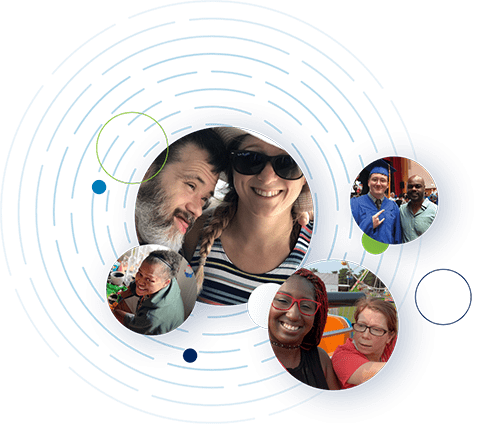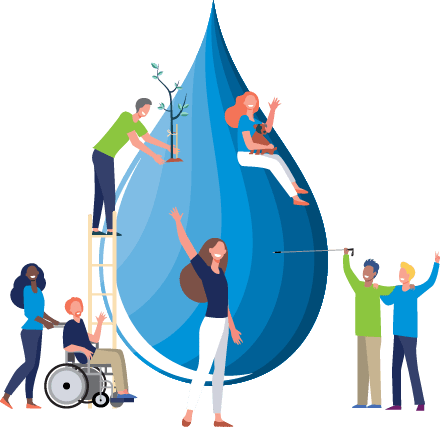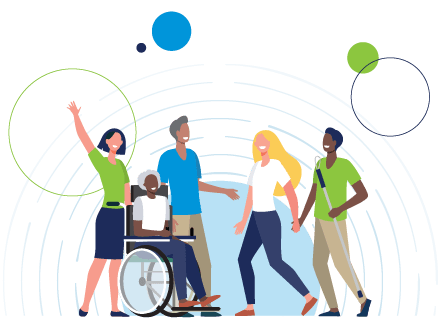Our Services Tailor-made supports
We offer support services that are as unique as each person's specific needs, providing better outcomes and a happier, more fulfilling life.

Community Systems, Inc. supports persons with a wide range of behavioral and development disorders.
At the core of every service is the belief that persons with disabilities enjoy happiness in their own homes, in their personal relationships, and as contributing members of their community. Our over thirty years experience, combined with our staunch belief in our mission, means exceptional support for your loved one and family.
“For us, CSI is our daughter’s independent home where she finds happiness and lives an independent lifestyle. Her CSI supports bring great structure and she loves living in her own home 1,700 miles away from her parents!” – Birgit Baldwin
We Support People with Autistic Disorder
Autistic disorder is a developmental disability which affects verbal and nonverbal communication and social interaction. Autistic disorder is usually evident before age 3 and will adversely affect a young child’s educational performance.
Children with autistic disorder may engage in repetitive activities, display stereotypical movements, resist environmental change, resist change in daily routines, and have unusual responses to sensory experiences (from the definition in the Federal Individuals with Disabilities Education Act). Responses can include a range of challenging behaviors.
Children who share some of these characteristics, but do not meet the full criteria for autistic disorder may be diagnosed as having Pervasive Developmental Disorder, or PDD. The causes of both PDD and autistic disorder are unknown.
Autistic disorder, which affects more men than women, affects persons lifelong. They may continue to have limited if any language skills and continue exhibiting the characteristics described above. With special supports, adults with autism can develop alternative, positive methods of non-verbal communication, live, work, and participate in their community. CSI helps many persons to do so.

We Support People with Brain Injury
CSI supports people with brain injuries resulting from various causes. Brain injuries may result from birth and, therefore, a brain injury may also be a developmental disability. Brain injuries may also result from injuries acquired either as a child or as an adult.

If, for example, a young child falls from playground equipment and suffers a brain injury, he, too, may be said to have an acquired brain injury AND a developmental disability as a result of the injury’s impact on multiple domains of his life.
If an adult suffers a head injury in a motorcycle accident, he or she is said to have an acquired brain injury (ABI). ABIs are a rising trend in the United States as a result of effective emergency and trauma care – that is, persons survive accidents which earlier they might not have. ABIs disproportionately affect young people, often caused by sports accidents (skiing, snow boarding, horseback riding, and others) and vehicle accidents. Brain injuries may also result from strokes, affecting persons of all ages.
All CSIs support persons with ABIs who have developmental disabilities. CSI/Northern Virginia, however, is distinctive among CSIs in having responsibility to provide drop-in residential supports to adults with a primary diagnosis of ABI. CSI/NV’s supports focus upon life skills training, community integration, environmental safety, and healthcare coordination.
We Support People with Challenging Behaviors
Some persons with developmental disabilities, including but not limited to persons with autism, experience challenging behaviors.
Challenging behaviors include assaults on property and/or people. Asocial behaviors include grabbing food from a family style dinner table. Unsafe behaviors include bolting into traffic, opening the door of a moving vehicle, and refusing to participate in fire drills.
There are many causes of these behaviors, among them: having never learned appropriate social behaviors while residing in an institution; having no other effective means of communication; and having anger at the lack of control in one’s life.
Persons with challenging behaviors can be supported successfully in their community, and Community Systems, Inc. specializes in supporting such persons. CSI utilizes a mix of well trained, experienced staff, consultants, and program strategies to help supported persons find success.
Program strategies include developing positive behavior support plans; helping persons acquire individual, alternative methods of communication; and allowing persons control over as many areas of their lives as safely possible. The objective is to give persons an internal locus of control, which heretofore has been lacking.
We Support People with Deaf/Blindness
Among the persons supported (by CSI/Massachusetts, in particular) are persons with deaf/blindness. Most, but not all such persons, also have intellectual and developmental disabilities.
Several of the persons with developmental disabilities have Rubella Syndrome, a result of their mother developing German Measles during pregnancy. Today, German Measles is preventable, and Rubella Syndrome is no longer experienced among newborns in the USA.
Previously, most persons with deaf/blindness lived in campus institutions, but increasingly persons are having the opportunity to live in their communities with special supports. CSI-supported homes for persons with deaf/blindness have special environmental adaptations, and the staff have special training in adaptive communication.
Among the people with deaf/blindness and without developmental disabilities, CSI notably helps two women with children and families live independently in their own homes.
Nearly all persons supported by Community Systems, Inc. (CSI), over 600 persons, have developmental disabilities.
Developmental disabilities are, by definition, acquired before one’s 18th birthday. According to the federal government’s definition, a developmental disability is a severe, chronic disability which:
- is attributable to mental and/or physical impairments
- is indefinite
- results in functional limitations in three or more areas of major life activity (self care, receptive and expressive language, learning, mobility, self-direction, capacity for independent living, and/or economic self-sufficiency), and
- results in a person’s need for special care, treatment, and other services which are lifelong or of extended duration.
In brief, mental retardation (now preferably termed intellectual disability) is a developmental disability.
A developmental disability may present in one or more of several ways and that, in turn, requires that CSI staff have special skills.
We Support People with Dual Diagnoses
Similar to the population at large, a certain percentage of persons with developmental disabilities also have formal diagnoses of mental illness (MI).
Many persons with intellectual disabilities and mental illness (ID/MI) are among the persons supported by Community Systems, Inc. Persons with dual diagnoses (ID/MI) can experience a full range of mental illnesses and accompanying symptoms.
Diagnosis is sometimes challenging for clinicians, because a person’s intellectual disabilities may impair their insight and accurate reporting of symptoms.
Persons with dual diagnoses are helped with a variety of strategies, including:
- Positive behavioral supports
- Psychiatrists and psychologists who specialize in ID/MI
- Well-trained CSI staff
- Approved psychotropic medications
- And community supports
Persons with ID/MI live and work successfully in their community with residential and employment supports provided by CSI. A few may require infrequent and brief inpatient hospitalization but, if so, return to their CSI-supported homes thereafter.
We Support People with Severe Physical Challenges
Some persons with developmental disabilities experience severe physical disabilities as well. Physical disabilities may affect mobility, respiratory function, gastrointestinal function, and neurological function.
These accompanying disabilities may be present from birth, or they may develop as a compounding factor of a developmental disability, for example, from prolonged use of certain medications.
Among the persons supported by Community Systems, Inc. are persons who experience quadriplegia, paraplegia, and hemiplegia. Cerebral palsy is one cause of mobility impairments. Also among persons supported are those with impaired respiratory function who may require supplemental oxygen either continuously or intermittently. Persons with swallowing disorders requiring feeding tubes are also among persons supported by CSI.
Persons with severe physical disabilities require considerable adaptive equipment, which may include overhead lifts, adjustable beds, oxygen canisters, and other equipment. (None of the people supported by CSI currently is ventilator dependent at home.) Having certain physical disabilities, especially in combination, may require that persons have daily or even 24-hour nursing and, if so, CSI will provide such staffing.
Of note, none of these disabilities is reason for a person to remain institutionalized, although persons with severe physical disabilities predominate among those remaining in state intellectual disability institutions. Persons with severe physical disabilities supported by CSI live in small group residences (six or fewer persons) in their community.
We Support People with Prader-Willi Syndrome
Among the persons supported by Community Systems, Inc. (currently by CSI/Northern Virginia and CSI/Massachusetts) are persons with Prader Willi Syndrome (PWS).
PWS is a rare genetic disorder (believed to result from a spontaneous genetic birth defect, not an inherited condition) that is experienced by approximately 1 in 14,000 persons living in the United States.
A person with PWS has a characteristic physical appearance which includes short stature, poor muscle tone, and a tendency to obesity. He or she presents with learning disabilities or mild intellectual disabilities and oftentimes aberrant behaviors (including tantrums, stealing, lying, and obsessive-compulsive behaviors).
Because persons with PWS experience constant hunger which cannot be satiated, they will resort to extreme attempts to obtain food, which can include seeking garbage, stealing food, and other extreme measures. Without restrictions on their lifestyle, persons with PWS will acquire high blood pressure, respiratory distress, diabetes, and/or other weight associated disorders. The latter is compounded by the fact that persons with PWS may only eat 800 to 1,000 calories/day without gaining weight. Without external controls, weight gain can occur very rapidly and become life threatening.
As a result of the inherent risks of living with PWS, persons will require life-long special supports. Without such supports, persons with PWS may die in their young adult years. Persons supported by CSI may live singly or with others having PWS, because restrictions on food access are warranted which would be viewed as inappropriate for other persons. Positive behavioral supports are an important program component. CSI staff plan carefully for people with PWS to live fully with staff guidance and discrete behavioral controls. CSI is noted for the normalcy it has helped young people with PWS achieve in their lifestyles.
Families and persons with PWS have the benefit of a very active national association, the Prader-Willi Syndrome Association, which provides newsletters, family support groups, and a national conference, among other services. (1-800-926-4797).
